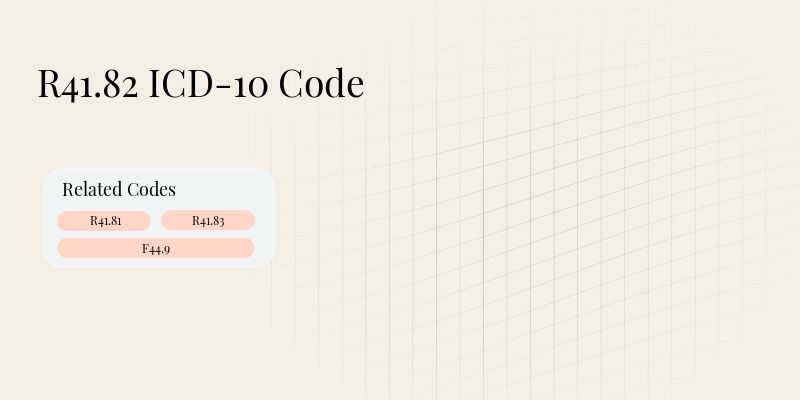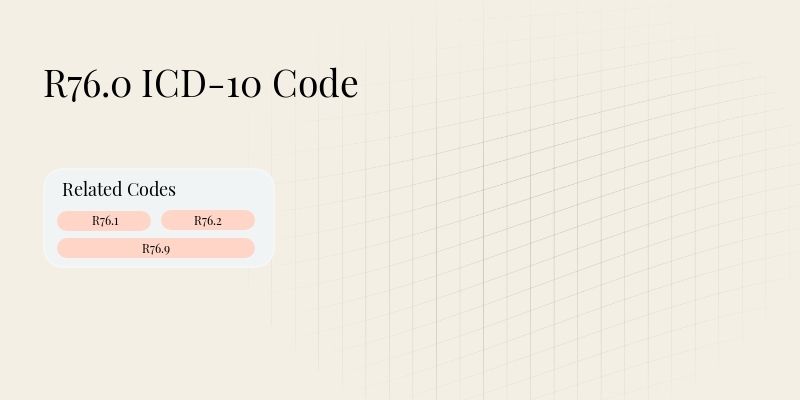
R41.82 ICD-10 Code: Altered mental status

Key Takeaways
- What R41.82 ICD-10 Code Covers: This code specifically indicates an altered mental status, which can be due to various underlying conditions such as intoxication, metabolic disorders, or neurological issues. Accurate coding is crucial for proper treatment and billing.
- Session duration requirements: Generally, there are no specific session duration requirements tied to this code; however, thorough documentation of the clinical encounter is necessary to support the diagnosis.
- Who can use the code: Physicians, nurses, and other healthcare providers involved in diagnosing and treating patients with altered mental status can use this code. It is essential for ensuring proper reimbursement for services rendered.
- Best practices for proper use: Ensure comprehensive documentation of the patient's symptoms, history, and any tests conducted. This helps in justifying the use of the code and avoiding potential denials.
- Example of actual usage: A patient presenting to the emergency room with confusion and disorientation due to a severe metabolic imbalance may be coded with R41.82 after thorough evaluation.
What is R41.82 ICD-10 Code
The R41.82 ICD‑10 code is designated for cases of altered mental status, a condition where a patient's cognitive function is significantly impaired. This alteration can manifest in various ways, including confusion, disorientation, or an inability to concentrate. The underlying causes can range from transient issues like intoxication to more severe conditions such as stroke or severe infections.
Recognizing and coding altered mental status accurately is essential for healthcare providers. This code serves as a critical component in the patient's medical record, aiding in the diagnosis and guiding treatment protocols. Accurate documentation also plays a vital role in ensuring that appropriate reimbursement is received for the services rendered.
Services Covered Under R41.82 ICD-10 Code
Numerous services can be associated with the altered mental status diagnosis. Below is a detailed table outlining these services:
Service | Description |
|---|---|
Emergency Room Evaluation | A comprehensive assessment of the patient, including physical examination and history taking to determine the underlying cause of altered mental status. |
Cognitive Testing | Standardized tests to assess the patient's cognitive abilities and determine the extent of impairment. |
Neurological Consultations | Specialist evaluations to rule out neurological causes contributing to the altered mental state. |
Laboratory Tests | Blood tests and imaging studies conducted to identify metabolic or infectious causes of altered mental status. |
Who Can Use the R41.82 ICD-10 Code?
This code can be employed by various healthcare professionals involved in the diagnosis and treatment of patients with altered mental status. The following professionals typically use this code:
- Emergency Room Physicians: Often the first to assess and manage patients with altered cognitive functions.
- Primary Care Physicians: Responsible for follow-up care and ongoing management of patients experiencing mental status changes.
- Nurses: Integral in documenting patient symptoms and providing care as directed by physicians.
- Psychiatrists: May use this code when evaluating patients with potential psychiatric conditions that affect cognitive function.
How to Use R41.82 ICD-10 Code
Using this code effectively involves understanding the context in which it should be applied. Here are some best practices:
- Document Patient Symptoms: Clearly note the patient's complaints such as confusion or disorientation. For example, a patient might report, "I do not know where I am," indicating altered mental status.
- Provide Clinical History: Include relevant medical history that may contribute to the condition. For instance, a history of diabetes may explain episodes of altered mental status due to hypoglycemia.
- Conduct Necessary Tests: Ensure that any laboratory or imaging results that support the diagnosis are included. For example, elevated ammonia levels might indicate hepatic encephalopathy.
Reimbursement Rates for R41.82 ICD-10 Code
Reimbursement rates can vary widely between private and public insurance plans. Below is a comparison table:
Insurance Type | Reimbursement Rate |
|---|---|
Medicare | $150 - $200 |
Medicaid | $100 - $150 |
Private Insurance | $200 - $300 |
Disclaimer: Reimbursement rates change frequently and depend on various factors, including geographic location and specific insurance plans. This article will be updated with average prices to reflect the most current data.
Benefits of R41.82 ICD-10 Code
Understanding the benefits of accurate coding can enhance patient care and streamline billing processes. Below is a summary of the key benefits:
Benefit | Importance |
|---|---|
Improved Patient Care | Accurate coding leads to appropriate diagnosis and treatment plans, enhancing patient outcomes. |
Efficient Billing Processes | Proper coding reduces the likelihood of claim denials and expedites reimbursement. |
Enhanced Data Tracking | Allows healthcare providers to analyze trends and improve care protocols for altered mental status. |
Common Mistakes to Avoid with R41.82 ICD-10 Code
Misuse of this code can lead to audits and denials, impacting both revenue and patient care. Below are common mistakes to avoid:
- Inadequate Documentation: Failing to provide sufficient details about the patient's symptoms may lead to claim denials. For example, if a nurse documents only "confusion" without further details, it could result in questions about the diagnosis.
- Incorrect Code Selection: Using a different code that does not accurately reflect the patient's condition can result in improper billing. For instance, selecting a code for delirium instead of altered mental status when the latter is more appropriate.
- Failure to Update Patient Records: Not updating the patient’s medical history can lead to inaccurate coding. If a physician sees a patient with a known history of substance abuse but does not note it, this crucial context might be overlooked.
R41.82 ICD-10 Code vs other codes
Comparing this code to others helps clarify its specific use cases and context in medical coding practices. Below is a comparison table:
Code | Description | Difference |
|---|---|---|
R41.82 | Altered mental status | Broadly applicable to various causes of cognitive impairment. |
R41.0 | Global aphasia | Specifically refers to language impairment, not general cognitive function. |
F05 | Delirium due to known physiological condition | Indicates a specific cause for cognitive impairment, unlike R41.82. |
Conclusion
The R41.82 ICD‑10 code for altered mental status is crucial for accurately diagnosing and treating patients with cognitive impairments. It encompasses various underlying causes and requires thorough documentation to ensure appropriate billing and reimbursement. Healthcare professionals, including emergency room physicians, nurses, and psychiatrists, can effectively use this code to enhance patient care.
Understanding the services covered under this code, the reimbursement rates, and the potential pitfalls in coding practices can lead to improved outcomes for both patients and healthcare providers.
Disclaimer: This article is for informational purposes only and does not constitute legal or medical advice. Always consult professional guidelines and regulatory bodies for specific compliance requirements.
Frequently Asked Questions
Reduce burnout,
improve patient care.
Join thousands of clinicians already using AI to become more efficient.

R76.0 ICD-10 Code: Positive ANA
Discover essential insights on the R76.0 ICD-10 Code code for health professionals. Enhance your practice and navigate billing with confidence.

F32.1 ICD-10 Code: Major Depressive Disorder
Discover essential insights on the F32.1 ICD-10 Code code for health professionals. Enhance your practice and navigate billing with confidence.

97124 CPT Code: Therapeutic Massage Therapy
Discover essential insights on the 97124 CPT Code code for health professionals. Enhance your practice and navigate billing with confidence.
